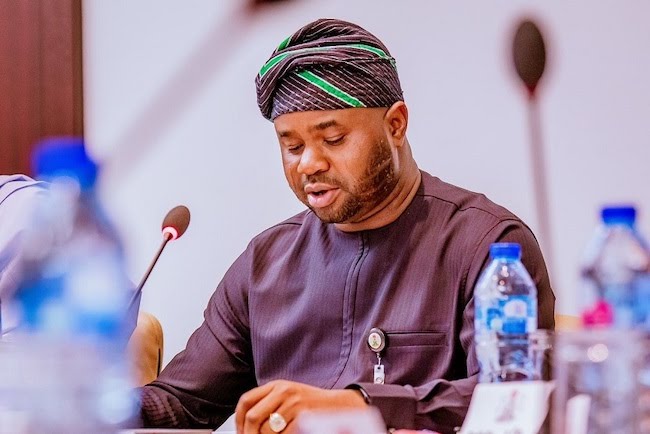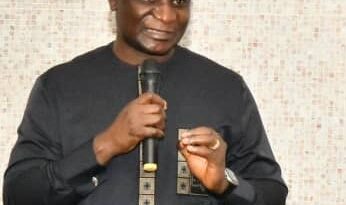As Tax Reform Bills Turned Tax Man Zacch Adedeji To A Teacher
By Abass Abdullahi
The Chairman of the Federal Inland Revenue Service (FIRS), Dr Zacch Adedeji, a seasoned Accountant and an accomplished public sector administrator, has been synonymous with tax collection. In fact, he is seen as the Nigeria version of the Biblical Zaccheous, the Tax Collector.
However, issues on the recently introduced Tax Reform Bills have exposed the other side of Dr Zacch Adedeji, such that among the community of tax administrators in the country today, he will most probably be regarded as “Zacch The Teacher.”
At the public hearing on the tax reform bills held at the House of Representatives in Abuja, last week, the teacher in him stood out so tall. Using simple and clear language, he broke down all issues concerning the tax reform bills such that even kindergarten pupils will understand.
First, he hit the nail on the head so hard that those who already told positions against the bills could not but see reasons the tax reform bills were desirable. Zacch Adedeji, stated that the current tax law benefits just three out of the 36 States in the country and the three States receive more than 70 percent of the Value Added Tax (VAT), leaving other states with little to nothing.
The FIRS Chairman went further to explained that the current VAT sharing arrangement primarily benefits Lagos, the Federal Capital Territory (FCT), and Rivers States where most corporate head offices are located.
He further noted that the proposed reforms was aimed at addressing this imbalance by introducing a derivation principle model, ensuring a more equitable distribution of VAT revenues to all states, regardless of their economic status.
Adedeji then took time to reel out of the data on the sharing of VAT revenue for the month of October.
“Lagos will take 42 percent of the VAT. Rivers will take 16 percent. Oyo State will take 5.2 percent, FCT will take 9 percent. If you take those three States, they are taking more than 70 percent of the tax.
“Why? Because those are the places where the head offices of those places are. And we know that 70 percent of consumption is not happening in those three states.
“So in whatever way you look at it, there is no way every other state apart from Lagos, Rivers, FCT, benefits from the proposed tax bill.
“If you look at it, MTN contributed highest, but because MTN headquarters is in Lagos, all the allocation from MTN is being accrued to Lagos. So, when this bill is passed, all states will benefit irrespective of the kind of economic situation that is happening in Nigeria,” the FIRS Chairman said.
On the derivation principle for Consumption Tax, Adedeji clarified that the model applies specifically to consumption tax or VAT.He emphasized that this model should not be mistaken for the derivation principle applied to oil-producing states, which is based on the location of production.
He explained that, in the case of consumption tax, derivation means the funds will be allocated to the states where the commodity is consumed, rather than the states where corporate head offices are situated.
Adedeji said; “On derivation, I see there is a mix-up here. We have the oil and gas. If you look at the oil and gas, where they produce is where we sell and collect money from the oil. That’s why it is limited to their States.
“VAT by definition is a consumption tax. If you use derivation in VAT, what it means is that where is it consumed. Where do you make the call? Where is the bank transaction done? What the bill seeks to correct is that the existing structure we have does not represent the intent of Nigeria.”
Less than one week after he took time to explain the benefits and desirability of the new tax bills to members of the House of Representatives, converts are now the ones promoting it and speaking to the public on the desirability of the new tax bills.
One of the prominent members of the House of Representatives, Hon Abdulmumin Jibrin, representing the Kiru/Bebeji federal constituency of Kano State, was on National Television a few days ago, expressing confidence that the Tax Reform Bills will be approved by both chambers of the National Assembly.
Abdulmumin Jibrin stated that the President Bola Tinubu’s tax reform bills and other economic policies were designed to benefit Nigerians in the long term.
“I have no doubt about the consideration and passage of the Tax Reform Bills. We will pass the tax reform bills,” he asserted.
Jibrin acknowledged that there is a perception in the North that the reform bills are not favorable to them. However, he emphasized that efforts are being made to educate people about the benefits and necessity of the reforms. The lawmaker highlighted that the advantages of the tax reform bills far outweigh any perceived disadvantages.
“For those of us who have thoroughly reviewed the bills, the overall benefits surpass any perceived drawbacks by any individual or region,” he explained.
“President Tinubu, along with the Chairman of the Federal Inland Revenue Service (FIRS), is not seeking a battle over the bills but rather aims to ensure understanding of their objectives and goals, which focus on better revenue generation and distribution for the country’s economic survival.
“While there may be contentious clauses in the bills, this does not mean they should be discarded or ignored by the National Assembly. Since the bills are already before us, it is the responsibility of both chambers to allow them to undergo the necessary legislative processes, which would enable the amendment of contentious clauses, as they are not set in stone.
“As I mentioned a few days ago on a similar program, many of those opposing the bills have not read them and are merely reacting to incorrect narratives being spread by others,” he said.
Jibrin also praised President Tinubu’s commitment to economic reforms, citing the removal of fuel subsidies and the floating of the Naira as examples.
He believes that these reforms, along with the proposed tax reform, will transform the nation’s economy despite the current challenges.
“President Tinubu, in my view, is sacrificing his present for the future of Nigerians through the courageous and long-term result-oriented reforms being implemented now,” he concluded.
Meanwhile, while he goes about carrying out his new “teaching job,” Zacch Adedeji, is also announcing significant increment in revenue generation, with the Federal Government successfully collecting N1.5 trillion in Education Tax, as against its target of N70 billion.
He noted that, overall, from the N19.4 trillion earmarked for the fiscal year 2024, N18.5 trillion had been collected by the end of September.
Adedeji shared this information during a collaborative meeting with the joint Committees on Finance, Budget, and National Planning of the National Assembly, focusing on the 2025-2027 Medium Term Expenditure.
He said, “On Education tax, while N70bn was targeted, a total of N1.5tn has been realised.
“All in all, out of N19.4tn targeted for 2024 fiscal year, N18.5tn was realised as of the end of September, which clearly shows that the target, will be far exceeded by the end of the year.”
Abass Abdullahi, a public affairs commentator lives in Kaduna




